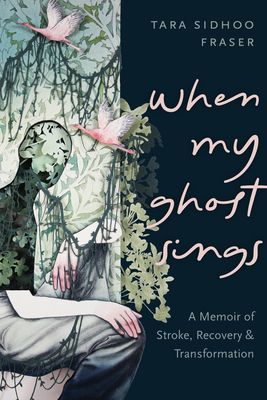It’s Disability Pride Month! This month we celebrate disabled, chronically ill, Deaf, and neurodivergent authors. So let’s talk about a disability memoir that I can’t stop thinking about.

When My Ghost Sings: A Memoir of Stroke, Recovery, and Transformation by Tara Sidhoo Fraser
When Fraser is thirty-two years old, she experiences a stroke. Her doctor discovers that she has a rare mutation that caused her brain to hemorrhage. After doctors performed the surgery that saved her life, Fraser wakes up only to realize that she has no memory of her past life. Fraser names her past self “Ghost”, a lingering presence that seems to remain at the edges of her consciousness.
When My Ghost Sings follows Fraser after her stroke. She has a new partner named Jude, a new job—a whole new life. But Ghost’s voice begins to become clearer, louder in Fraser’s mind. She finds herself drawn to her past life, somehow desiring closure for a life that doesn’t feel like her own. As the book progresses, we learn more about Fraser’s previous life in flashbacks, getting glimpses of the memories that seem like a distant dream. And as Ghost’s life becomes clearer, so do her memories.
As someone with memory loss, I find myself more and more drawn to other narratives around memory loss and recovery. Of course, recovery can look so different, especially when it comes to the brain. Fraser’s story is so deeply personal and so vulnerable as she describes her experience recovering from such a devastating event. How does one handle waking up with a partner you don’t remember? How do you deal with waking up with a life you aren’t even sure you want? Fraser bravely writes into these questions, refusing to shy away from the messiness of it all. Recovery isn’t straightforward or linear. And neither is Fraser’s story. And it’s all the better for it.
When My Ghost Sings an intimate look at illness and recovery, the complications and challenges that people with memory loss experience. It’s a must-read for anyone looking to better understand what people like Fraser experience. And, most importantly, other people who have experienced strokes and/or memory loss will be able to see themselves and deeply connect with Fraser’s story.
You can find me over on my substack Winchester Ave, over on Instagram @kdwinchester, on TikTok @kendrawinchester, or on my podcast Read Appalachia. As always, feel free to drop me a line at kendra.d.winchester@gmail.com. For even MORE bookish content, you can find my articles over on Book Riot.
Happy reading, Friends!
~ Kendra

